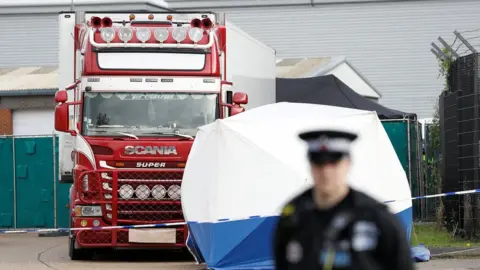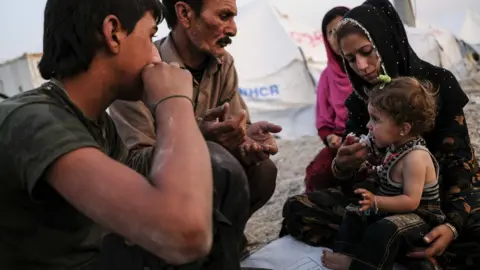Why do people risk their lives to get to the UK?
 Reuters
ReutersThe exact circumstances of how 39 people came to be found dead in a lorry container on an industrial estate in Essex are yet to be confirmed, but questions have been raised about refugees and why they risk their lives to get to the UK.
Thousands of people have died trying to get to safety in Europe, some in the back of inter-continental lorries and others in small boats (some 17,480 migrants globally have drowned since the start of the 2014 crisis, according to UN data).
There are all sorts of "painful and distressing" reasons people leave their home countries, according to Debbie Busler, head of refugee support at the British Red Cross.
They might be fleeing conflict or escaping political, religious or sexuality-based persecution, for example.
"Many people are so desperate to leave their country and get to safety they are prepared to risk their lives," Ms Busler says.
"Risking their life is better than what they are escaping from."
Official resettlement routes can take years to navigate with a complicated "adversarial system" often lacking simple support services like interpreters, Ms Busler says.
"We want people to be treated with respect and dignity and for everyone to recognise these are real people in really difficult circumstances," Ms Busley says, adding: "Don't just see them under the term of 'asylum seeker'."
 Getty Images
Getty ImagesThe completion of a fence on the Bulgaria-Turkey border has seen people adopting different methods to get into Europe, according to the BBC's Eastern European correspondent Nick Thorpe.
"Most asylum seekers trying to reach Western Europe do so hidden in trucks," he says.
"One part of the smugglers' network hands them on to others. They are then kept in 'safe' houses in Bulgaria, usually close to the Serbian or Romanian borders, to be put into new trucks bound for Western Europe.
"Since 2016, there have been fewer and fewer ways to enter Western Europe legally - hence the desperation of those on the road."
Official figures have shown a decrease in the numbers seeking asylum, but numbers of those using unofficial routes are much harder to quantify.
In the first nine months of this year, 1,742 people applied for asylum in Bulgaria of whom 132 were granted asylum, 212 were granted humanitarian status and 932 were refused.
In 2018, 2,536 applied, in 2017 there were 3,700 applications and in 2016 there were 19,480.

Since the start of the 2014 migrant crisis, 12 migrants have been found dead and one is missing presumed dead after illegally entering the UK, according to the UN's International Organisation for Migration (IOM).
These included a man who fell from a plane into a garden in London.
Five of those 12 died in a lorry or goods vehicles or from falling from such a vehicle.
Other incidents involving multiple deaths in a lorry included one in Austria in 2015, when there were 71 victims.
Finding migrants entering the UK in lorries is a big task, according to the National Crime Agency (NCA).
Some 3.6 million lorries and containers entered the country in 2018 using 40 main ports, Department for Transport figures show.
"The length of the UK's coastline and the sheer volume of passengers and freight entering the UK every year make identifying shipments containing illegal migrants a significant challenge," an NCA spokesman said.
"People smugglers continue to favour hard-sided refrigerated lorries to transport migrants to the UK.
"They also attempt to smuggle migrants in concealments in vans."
